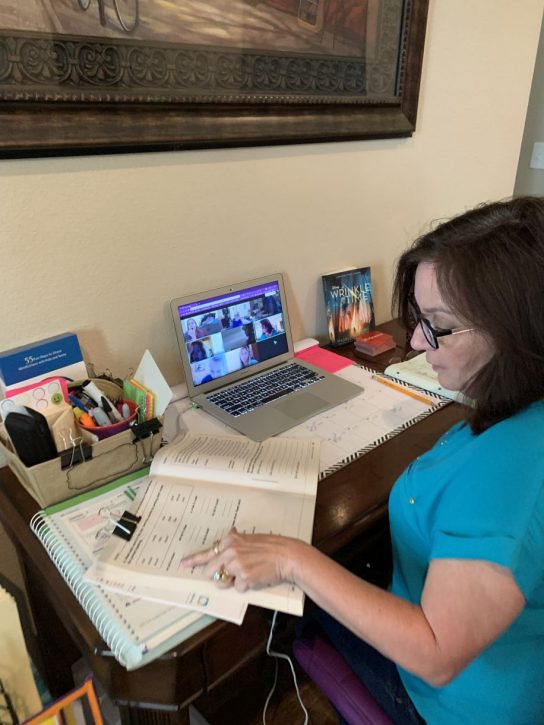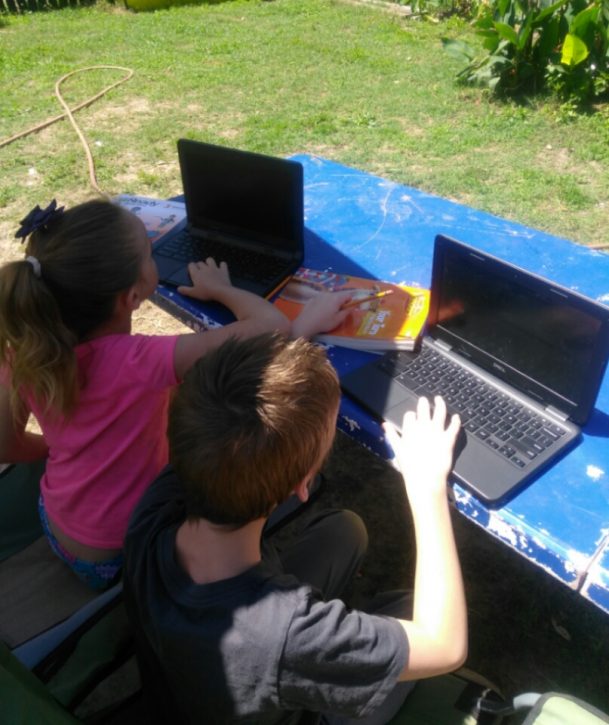By Gina Castro

Escambia County Superintendent Malcom Thomas explained that this transition has had its hiccups. For one, they had to make sure that approximately 40,000 students in the county had a district issued Chromebook. Students in kindergarten through second grade had to be issued computers for the first time ever. After crossing that hurdle, Thomas said that the district had to create alternatives for students who didn’t have access to wifi, such as flash drives with workbooks on them. Thomas explained that a persistent issue during this process has been trying to contact parents to inform them about the transition to online. There are still about 4 percent of the students who the district hasn’t been able to reach.
Thomas said that he and the school district are very aware of how challenging dealing with this pandemic has been for the parents and students. “We’ve told our teachers that we expect two things: flexibility and compassion,” Thomas said. “Meaning, we try to meet the needs and accommodate the families as best as we can.”

To help bridge the gap of communication between parents and teachers, the district created Google Voice numbers for each teacher and instructed that the teachers respond to emails and calls within 24 hours.
Teachers have found creative ways to connect and teach their students. Madeline Pisani, a third grade teacher at West Pensacola Elementary, uses Google Classroom and does her best to replicate her class’s learning routine. “My approach was that if I’m on there at the same time everyday, then, eventually, the children will catch on,” Pisani said. “I try to keep it as close to what we were doing face to face as possible.”
Since elementary students in Escambia County have a single teacher, Pisani teaches all of the core subjects to her students. Every two weeks, Pisani uploads the class’s classroom calendar, which has all of the lessons the students are expected to complete each day, so that parents and students can keep track. Pisani has her students log on to their computers from 9 am to 11 am to work on their math and reading on I-Ready. Pisani then does a live lecture with the students at 11 am, which typically lasts between 30 minutes to an hour depending on the number of questions.
After a lunch break, the students work on science and social studies from 1 pm to 2 pm. At 2 pm, the students tune into a live lecture with Pisani and then the school day is done. “The hardest part was getting everything set up so that the parents knew what to do and when to do it,” Pisani said. Pisani has a total of 17 students, but she typically has only 10 students show up for her online lectures, but she has had some lectures with as much as 16 students.
Pisani explained that she has some students she has to do one-on-one lessons with because their parent’s work schedule doesn’t work with the online school schedule. “My number one goal is to keep them motivated so they still keep learning even though we’re not there to push them,” Pisani said.
Thomas explained that the priority during this time is to have one graded assignment for each core assignment per week. “I cannot expect teachers to have the volume of assignments they would have face-to-face,” Thomas said. “The elementary teachers will be focused on reading, math, science and social studies. We are not going to worry about grades in music or art.”

Although elementary students will not be expected to do assignments in art or music, Montclair Elementary art teacher Megan Brees created a YouTube channel, Making Art a Brees, to show her students art they can create within their own backyard or home. “I want to give them an artistic release to get their minds off of the fear and the uncertainty and not put pressure on them,” Brees said. “I know that a lot of these kids are just trying to survive at this point and trying to get their school work done.”
The online school process for middle school and high school are similar. Each course the student is enrolled in will have one graded assignment submitted per week. Thomas explained that teachers’ grading during this time will be more liberal as part of that compassion element. “If a student were passing before we had to shut down, we do not want the online learning to be the element that causes the student to have their grades drop,” Thomas said. “Students that were struggling and failing before the break, they are going to continue to struggle and fail online because the bulk of the year was already in the books before we had to shut down.”
For parents like Becky Hildebrand, whose daughter Mallory McCutchen is a sixth grader at
Ferry Pass Middle School, that news that her overall grades will not be affected by this transition is like a breath of fresh air. McCutchen makes great grades face-to-face but is struggling with the change in routine. “Mallory definitely does better in a structured environment. She has trouble staying on task and prioritizing,” Hildebrand said.
Hildebrand explained that her daughter doesn’t have any student- teacher interaction other than communicating via email. “Mallory probably is not receiving a decent education at this point. I feel sorry for the kids who struggle in school and do not have a parent home with them during this time,” Hildebrand said. “I do feel that everyone, adults and children are struggling right now and doing the best they can under our current circumstances.”
Katie Cuson, an algebra 1 and 2 teacher at Escambia High School, said that the teachers were given a schedule of what subjects to publish Monday through Friday. Then the assignments are due at midnight the day before that subject’s next week of assignments are due. So, on Mondays, Cuson along with the whole math department publish their assignments onto Canvas. Cuson’s strategy for teaching her students is to upload screencasts of her doing the math problem on a whiteboard app while she narrates each step.
Florida Gov. Ron DeSantis suspended all state tests, which includes EOC’s and AP exams. “It’s unfortunate, but it is what it is,” Cuson said. “We’re not going to be able to get through all of the curriculum, and then we’re going into summer and kids are going to lose what they barely knew.”
“If we are able to return to school, we are not going to give our district semester exams because they didn’t master the content. None of us believe we can be as effective during this month as we would have been face-to-face.” Thomas explained. “We are not going to be punitive to a student and give them a test that they possibly did not cover.”
As for parents of seniors like Paula Rode, whose triplets are graduating top 10 in their class this May, they are upset about much more than testing being canceled. “As far as being fair, none of this is fair for seniors. They’ve missed the prom, graduation and all the fun things seniors should be going through,” Rode said.
The COVID-19 pandemic has resulted in a challenging and frustrating time for everyone. Thomas urges that if your student is struggling with his or her assignments, reach out to your student’s teacher.